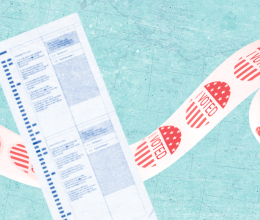COLUMBUS, OHIO —Today, Ohio A. Philip Randolph Institute (Ohio APRI), Northeast Ohio Coalition for the Homeless (NEOCH), and long-time Ohio resident Larry Harmon announced that they had reached a settlement agreement with Ohio Secretary of State Frank LaRose, concluding the long-running litigation in Ohio A. Philip Randolph Institute v. LaRose that challenged Ohio’s method of purging its voter rolls.
The settlement reached today allows all of the eligible voters removed through 2019 under a purge practice known as the Supplemental Process to cast a provisional ballot in any local, state, special, or federal election through 2022 and have it counted. Casting a provisional ballot in any of these elections will also serve to restore the voter to the voter rolls, ensuring that the individual will be able to vote in future elections.
In 2016, the plaintiffs, represented by Demos and the ACLU of Ohio, brought a lawsuit challenging the Supplemental Process. The lawsuit asserted two separate legal claims, each charging that removals under the Supplemental Process violated the National Voter Registration Act of 1993 (NVRA). Today’s settlement concerns the second claim, in which the plaintiffs argued that voters targeted for removal under the Supplemental Process had not been provided proper notice that their status as registered voters was in jeopardy, and they could therefore not lawfully be removed in accordance with the NVRA.
“The reforms guaranteed by this settlement will go a long way in protecting Ohio voters’ right to exercise their voice in the political process,” said Freda Levenson, Legal Director at the ACLU of Ohio. “Today’s settlement will not only prevent substantial numbers of eligible voters from being disenfranchised at the polls, it will also promote democracy by guaranteeing that qualified voters are given additional opportunities to register.”
“Today’s settlement is a win for Ohio voters and for our democracy,” said Stuart Naifeh, Senior Counsel at Demos. “The NVRA’s protections, including the requirement that voters must be given meaningful notice before they can be removed, are there for a reason: to ensure that those who take the time to register are not thrown off the rolls without good evidence that they are no longer eligible. Today’s settlement guarantees that qualified voters who were removed without proper notice are still able to cast a ballot and have it counted. It makes sure that the voices of such voters are not excluded from the democratic process.”
In addition, the settlement entered today requires the Secretary to: (1) send eligible voters who are not registered a mailing informing them of that fact and notifying them of the deadline for registering for the November 2019 General Election, (2) direct boards of elections to use motor vehicle records to prevent people queued for removal in 2019 from being removed if their motor vehicle records indicate they still reside at the address where they are registered, and (3) advocate for changes to state law further modernize Ohio’s voter registration system.
“The settlement provides critical relief to voters of color and low-income voters in the state,” said Andre Washington, President of Ohio APRI. “We’ve seen that such voters have been removed from the rolls at higher rates than other portions of Ohio’s population.”
“As we have seen time and time again, homeless voters and other marginalized voters have to fight to make their voices heard in the electoral process,” said Chris Knestrick, Executive Director at NEOCH. “Today’s settlement not only provides a backstop to help ensure that those purged still have a way to exercise their fundamental right to vote, but it also requires that the Secretary continue to look for information beyond what is maintained by the Bureau of Motor Vehicles to verify a voter’s continued eligibility. This is essential to prevent already marginalized voters from being disproportionately removed from the registration rolls.”
In 2018, the U.S. Supreme Court rejected the plaintiffs’ first legal claim, which asserted that the Supplemental Process violates the NVRA because it targets voters for removal based purely on their failure to vote.
###





